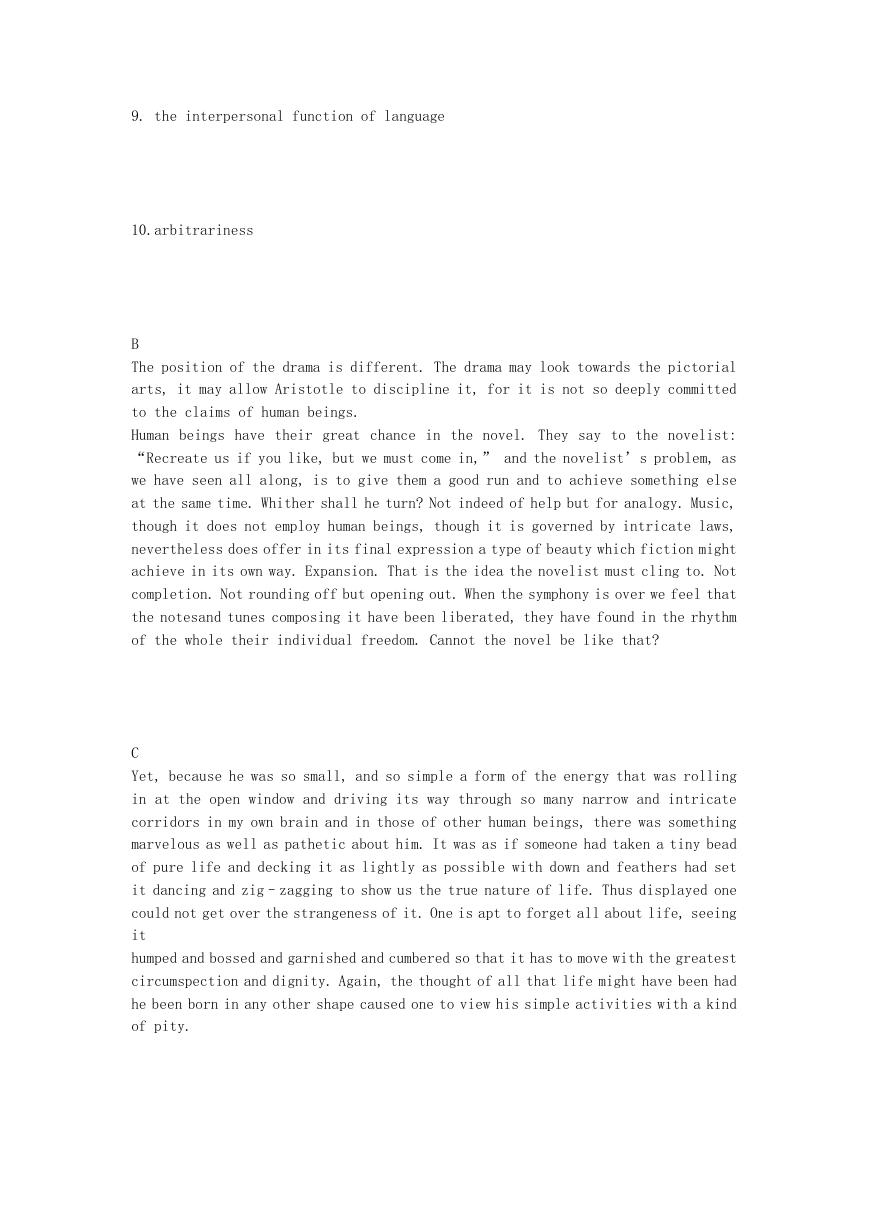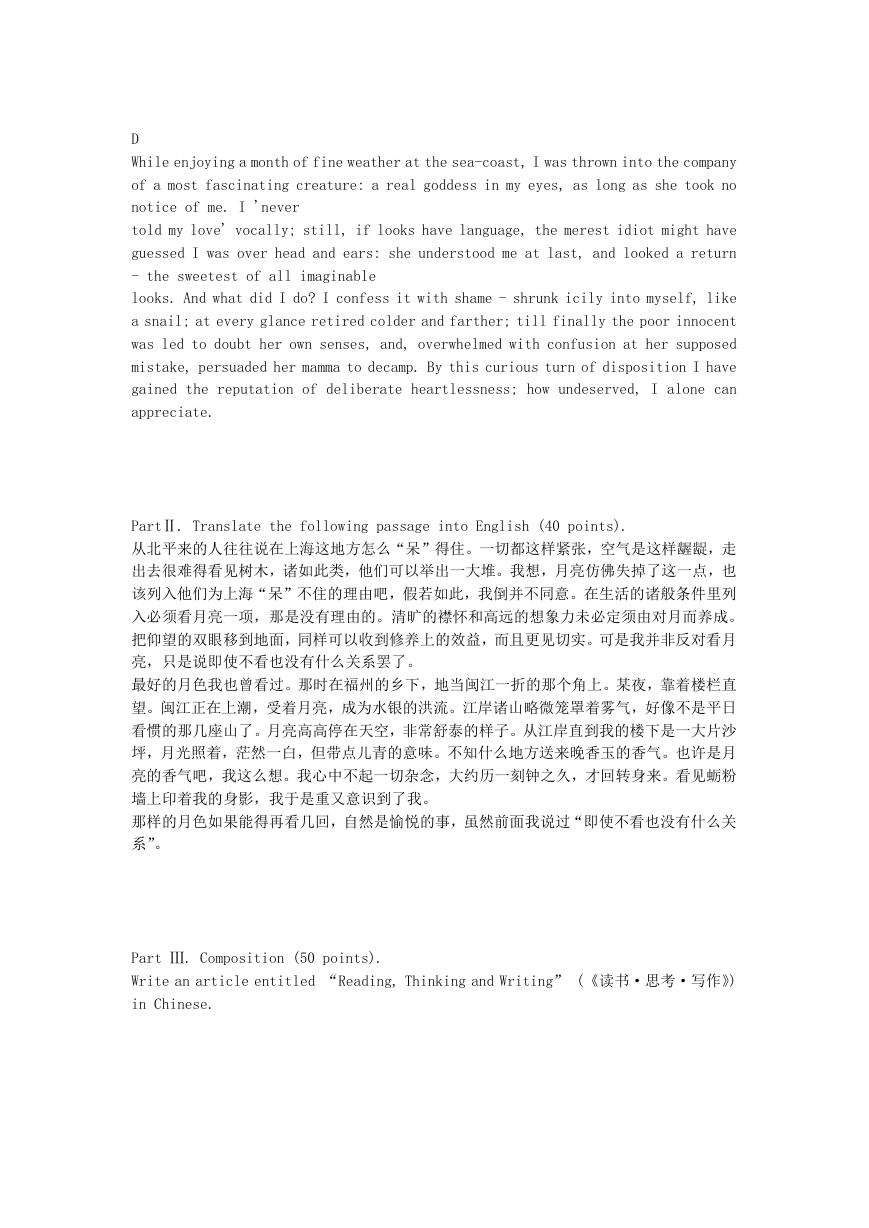2016 年山东青岛大学英汉互译与汉语写作考研真题
PartⅠ. Translate the following terms and passages into Chinese (60 points).
A
1. characterization
2. round character
3. structuralism
4. sonnet
5. new criticism
6. displacement
7. dialect
8. metaphor
�
9. the interpersonal function of language
10.arbitrariness
B
The position of the drama is different. The drama may look towards the pictorial
arts, it may allow Aristotle to discipline it, for it is not so deeply committed
to the claims of human beings.
Human beings have their great chance in the novel. They say to the novelist:
“Recreate us if you like, but we must come in,” and the novelist’s problem, as
we have seen all along, is to give them a good run and to achieve something else
at the same time. Whither shall he turn? Not indeed of help but for analogy. Music,
though it does not employ human beings, though it is governed by intricate laws,
nevertheless does offer in its final expression a type of beauty which fiction might
achieve in its own way. Expansion. That is the idea the novelist must cling to. Not
completion. Not rounding off but opening out. When the symphony is over we feel that
the notesand tunes composing it have been liberated, they have found in the rhythm
of the whole their individual freedom. Cannot the novel be like that?
C
Yet, because he was so small, and so simple a form of the energy that was rolling
in at the open window and driving its way through so many narrow and intricate
corridors in my own brain and in those of other human beings, there was something
marvelous as well as pathetic about him. It was as if someone had taken a tiny bead
of pure life and decking it as lightly as possible with down and feathers had set
it dancing and zig–zagging to show us the true nature of life. Thus displayed one
could not get over the strangeness of it. One is apt to forget all about life, seeing
it
humped and bossed and garnished and cumbered so that it has to move with the greatest
circumspection and dignity. Again, the thought of all that life might have been had
he been born in any other shape caused one to view his simple activities with a kind
of pity.
�
D
While enjoying a month of fine weather at the sea-coast, I was thrown into the company
of a most fascinating creature: a real goddess in my eyes, as long as she took no
notice of me. I 'never
told my love' vocally; still, if looks have language, the merest idiot might have
guessed I was over head and ears: she understood me at last, and looked a return
- the sweetest of all imaginable
looks. And what did I do? I confess it with shame - shrunk icily into myself, like
a snail; at every glance retired colder and farther; till finally the poor innocent
was led to doubt her own senses, and, overwhelmed with confusion at her supposed
mistake, persuaded her mamma to decamp. By this curious turn of disposition I have
gained the reputation of deliberate heartlessness; how undeserved, I alone can
appreciate.
PartⅡ. Translate the following passage into English (40 points).
从北平来的人往往说在上海这地方怎么“呆”得住。一切都这样紧张,空气是这样龌龊,走
出去很难得看见树木,诸如此类,他们可以举出一大堆。我想,月亮仿佛失掉了这一点,也
该列入他们为上海“呆”不住的理由吧,假若如此,我倒并不同意。在生活的诸般条件里列
入必须看月亮一项,那是没有理由的。清旷的襟怀和高远的想象力未必定须由对月而养成。
把仰望的双眼移到地面,同样可以收到修养上的效益,而且更见切实。可是我并非反对看月
亮,只是说即使不看也没有什么关系罢了。
最好的月色我也曾看过。那时在福州的乡下,地当闽江一折的那个角上。某夜,靠着楼栏直
望。闽江正在上潮,受着月亮,成为水银的洪流。江岸诸山略微笼罩着雾气,好像不是平日
看惯的那几座山了。月亮高高停在天空,非常舒泰的样子。从江岸直到我的楼下是一大片沙
坪,月光照着,茫然一白,但带点儿青的意味。不知什么地方送来晚香玉的香气。也许是月
亮的香气吧,我这么想。我心中不起一切杂念,大约历一刻钟之久,才回转身来。看见蛎粉
墙上印着我的身影,我于是重又意识到了我。
那样的月色如果能得再看几回,自然是愉悦的事,虽然前面我说过“即使不看也没有什么关
系”。
Part Ⅲ. Composition (50 points).
Write an article entitled “Reading, Thinking and Writing” (《读书·思考·写作》)
in Chinese.
�






 2023年江西萍乡中考道德与法治真题及答案.doc
2023年江西萍乡中考道德与法治真题及答案.doc 2012年重庆南川中考生物真题及答案.doc
2012年重庆南川中考生物真题及答案.doc 2013年江西师范大学地理学综合及文艺理论基础考研真题.doc
2013年江西师范大学地理学综合及文艺理论基础考研真题.doc 2020年四川甘孜小升初语文真题及答案I卷.doc
2020年四川甘孜小升初语文真题及答案I卷.doc 2020年注册岩土工程师专业基础考试真题及答案.doc
2020年注册岩土工程师专业基础考试真题及答案.doc 2023-2024学年福建省厦门市九年级上学期数学月考试题及答案.doc
2023-2024学年福建省厦门市九年级上学期数学月考试题及答案.doc 2021-2022学年辽宁省沈阳市大东区九年级上学期语文期末试题及答案.doc
2021-2022学年辽宁省沈阳市大东区九年级上学期语文期末试题及答案.doc 2022-2023学年北京东城区初三第一学期物理期末试卷及答案.doc
2022-2023学年北京东城区初三第一学期物理期末试卷及答案.doc 2018上半年江西教师资格初中地理学科知识与教学能力真题及答案.doc
2018上半年江西教师资格初中地理学科知识与教学能力真题及答案.doc 2012年河北国家公务员申论考试真题及答案-省级.doc
2012年河北国家公务员申论考试真题及答案-省级.doc 2020-2021学年江苏省扬州市江都区邵樊片九年级上学期数学第一次质量检测试题及答案.doc
2020-2021学年江苏省扬州市江都区邵樊片九年级上学期数学第一次质量检测试题及答案.doc 2022下半年黑龙江教师资格证中学综合素质真题及答案.doc
2022下半年黑龙江教师资格证中学综合素质真题及答案.doc